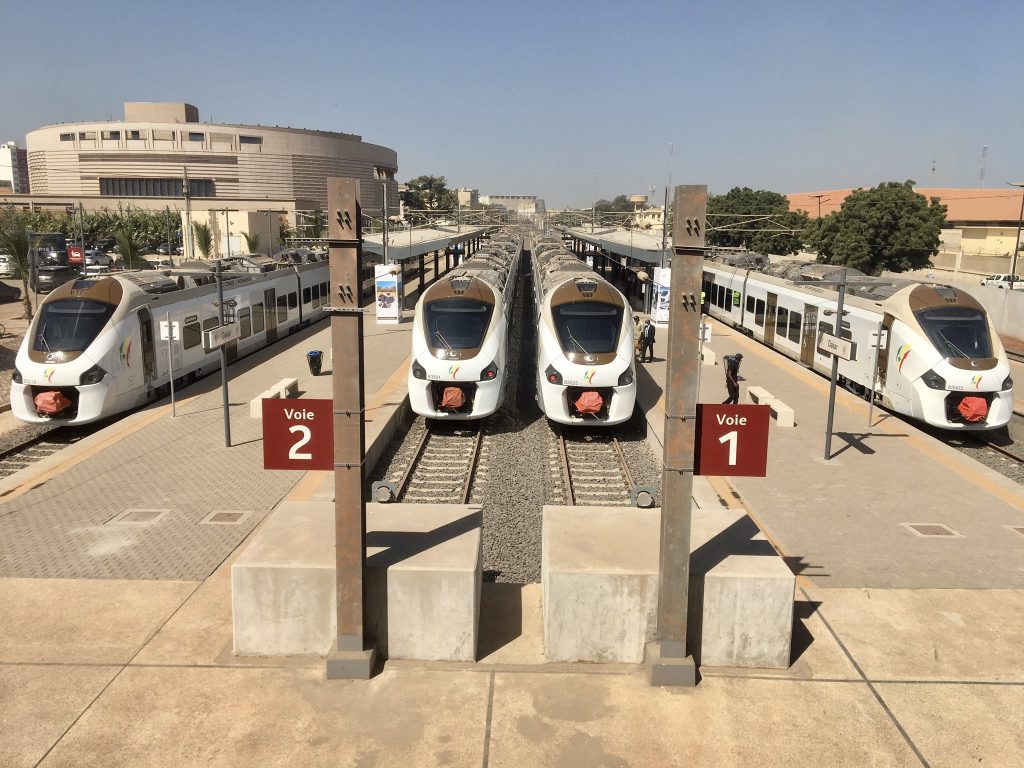It is by far one of the largest transport infrastructure projects ever undertaken in Senegal. The Dakar Regional Express Train (TER) has 200 stations serving 115,000 passengers a day and generating 22 billion CFA francs (over €33 million) a year for the country’s economy. The first section, operational since 2021, links the new town of Diamniadio to the capital over a distance of 36 kilometres.
At a cost of 568 billion CFA francs (over 865.9 million euros), financed mainly by the Senegalese government, the work on the first phase was carried out by around twenty companies. These include the French companies Equans and Thales, responsible for signalling and electrification of the passenger and freight tracks under the supervision of the Société d’études techniques et économiques (SETEC), and the Eiffage group, which specialises in civil engineering.
Decarbonising urban transport
The project, which is designed to relieve congestion in urban areas, is taking place against a backdrop of heavy air pollution generated by conventional vehicles such as taxis and coaches. The Dakar TER has already prevented the emission of 92,000 tonnes of CO2 equivalent. To take this commitment to decarbonisation a step further, the TER operating company (SETER) recently inaugurated a sign to raise awareness of the need to reduce the TER’s carbon footprint. This is a way of encouraging the 3.4 million people of Dakar to travel by train.
“A passenger who takes the TER will have an impact on the planet ten times less than if they had taken the car between Dakar and Rufisque (still known as the “Little Venice of the Third World”, editor’s note). Since the launch of our routes, we’ve been trying to raise people’s awareness of the need to protect the environment”, explains Patrick Tranzer, Seter’s Managing Director. He hopes that the towns of Thiès and Mbour, which have a population of just over 2.5 million, will also be served in the near future.
BOAD funding
These destinations will have to wait a while, as the second phase of the TER plans to link Diamniadio to Dakar’s Blaise Diagne airport (AIBD) in just 45 minutes over a 19-kilometre stretch. The work, which should be completed by December 2023, is supported by recent funding from the West African Development Bank (BOAD) to the tune of 35 billion CFA francs (53.4 million euros). “The aim is to improve the mobility of people and goods in the Dakar conurbation, reducing road congestion by at least 20%”, says the financial institution based in Lomé, Togo.*
Read also- SENEGAL: EIB, AFD and KfW finance 380 natural gas buses in Dakar
Meanwhile, the people of Senegal are waiting for the Bus Rapid Transit (BRT) to come into service. To date, technical tests have already been carried out following the acquisition by the Conseil exécutif des transports urbains de Dakar (CETUD) of 121 electric buses equipped with batteries with a capacity of 563.8 kWh. The CFA 128 billion (around €194 million) project is being financed by the French industrial group Meridiam, which specialises in the development and management of public infrastructure projects. At least 23 charging stations will be installed in 14 Dakar councils as part of this sustainable initiative.
Benoit-Ivan Wansi
